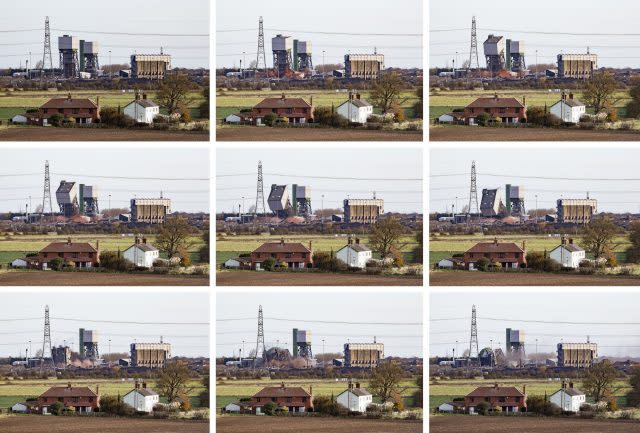Ex-miners 'heartbroken' as Kellingley Colliery headgear demolished

Former miners who gathered to watch the demolition of the headgear at Britain's last deep coal mine have said it was "heartbreaking".
The number two tower at Kellingley Colliery, North Yorkshire, was brought down with explosives in bright sunshine on Friday morning, leaving its twin number one tower standing by itself.

The pit - known as the Big K - was closed in December 2015, bringing to an end the UK's deep mining industry.
Small groups of men who worked at the pit gathered at vantage points around the former colliery site.
One group watched from a nearby road over a sea of solar panels, with the disused hulk of Ferrybridge coal-fired power station looming behind - a scene they said encapsulated the background to the Big K's demise.
Richard Dobrowolski said the twin towers will live on as he showed off a large tattoo of both headgear structures on his leg.
He said: "It's just a disgrace. I spent 34 years there. Kellingley was the only place I worked at and after seeing that happen, it's very sad. You wouldn't have expected that to happen when I first started at the pit. You thought you had it for life."

Mr Dobrowolski added: "Electricity - where we going to get it from? We're talking electric cars but how we are we going to charge them up?"
Stewart Awde said: "It's an emotional event. You can't work with men for nearly 40 years and not be attached to them.
"It's heartbreaking for the lads because it's been there for 60, 70 years and it's been a part of all our lives.
"Since the 1970s, when I started there, a lot of coal has come up and down that shaft, millions and millions of tonnes. It's kept the economy going and the local power stations."
Kellingley began production in 1965.
After the end of the Second World War there were almost 1,000 collieries employing up to a million miners, making the industry a powerhouse and major employer in communities across Britain.


